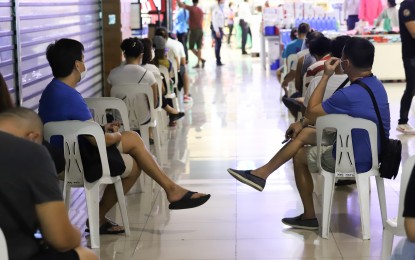
SOCIAL DISTANCING. Shoppers practice social distancing while waiting for their turn to enter the supermarket at Fisher Mall in Quezon City on Wednesday (April 22, 2020). Social distancing is one of the measures of the enhanced community quarantine to reduce risk of spreading Covid-19. (PNA photo by Robert Oswald P. Alfiler)
MANILA – Leaders of the House of Representatives have filed a measure seeking to establish policies and regulations for the “new normal” in workplaces and public spaces amid the ongoing threat from the coronavirus disease 2019 (Covid-19).
Under House Bill 6623 filed on Tuesday, Speaker Alan Peter Cayetano and other House leaders seek to institutionalize mandatory safety measures once Covid-19 restrictions are eased.
The bill mandates the wearing of masks in public places and workplaces, physical and social distancing of at least one to two meters between individuals, and temperature checks in all enclosed and semi-enclosed areas, as well as open areas where two or more people will gather.
“This bill will prepare and educate the Filipino public for life after (the) lifting of Covid-19 restrictions and to adapt to the new norms of physical distancing. It institutionalizes a new way of life after the enhanced community quarantine and serves as a guide to the public,” Cayetano said.
The measure also pushes for the mass testing of the population with the procurement of Covid-19 testing kits and personal protective equipment and the establishment of testing laboratories and contactless modes of testing, such as drive-through and phone-in test centers.
Public transportation
For the management of public transportation, mandatory safety measures shall be imposed on queuing and ticketing lines, as well as the interiors of vehicles and their respective passengers, drivers, and conductors.
The operation of motorcycle taxis shall remain suspended to prevent the spread of the virus through shared helmets and close physical contact between the passenger and driver.
Green lanes shall be established along roads, avenues, highways, and other transport infrastructure networks for health care, emergency, peace and order, and supply-chain vehicles transporting essential individuals, goods, equipment, and other critical services.
Special measures for airports, ports, and harbors shall include the establishment of public health corridors; mandatory taking of body temperature for all arriving and departing passengers; mandatory quarantine of all arriving passengers; thorough sanitizing and disinfection of all arriving and departing vessels; and if possible, regular testing of employees attached to vessels and rapid testing of passengers.
Workplace-specific protocols and measures
All government agencies shall implement with the same stringency the universal and standard safety measures for the new normal.
Food service workplaces can resume operations with take-out or delivery service only and can gradually re-introduce dine-ins.
When dine-in service resumes, restaurants should create more spaces in the dining area, maintain two-meter distances between tables, provide disposable menu booklets and cutlery, and promote contactless service for dine-in patrons.
Commercial stores and centers shall establish a maximum number of people inside, promote online transactions and shopping services, and implement cashless or contactless sales and customer service.
Offices in buildings should limit the number of people who use elevators, put markers to create visual boundaries for physical and social distancing, and discourage physical meetings.
Salons, parlors, and spas should observe frequent hand washing and sanitizing of salon tools, mandatory use of face masks and gloves, and apply best cleaning and disinfection practices in the facility.
Construction sites, factories, and industrial workplaces should adjust on-site and production schedules, provide mechanisms for work-site mobility and transportation, limit the use of co-workers’ tools and equipment, and implement individualized shifts for the use of equipment.
Education
All classes and school activities shall remain suspended until further notice without prejudice to academic freedom and levels of autonomy enjoyed by institutions of higher learning in the governance of their academic affairs.
However, the bill noted that no student shall be unreasonably penalized for his/her inability to participate in online means of learning due to issues in connectivity or availability of gadgets or equipment.
Schools, colleges, and universities must integrate online classes in the curriculum and promote creative ways of student learning and engagement without physical contact and/or reporting to the classroom.
They must also provide staggered school days and smaller class sizes if and when on-site classes resume.
Fast-track national ID, broadband program
The bill directs the Philippine Statistics Authority to fast-track and fully implement the Philippine Identification System Act to facilitate the profiling, contact-tracing, and distribution of forms of assistance under the new normal period.
The bill also mandates the Department of Information and Communications Technology (DICT) to expedite the national broadband program, which shall serve as the backbone infrastructure of the movement of essential and significant public and private transactions to digital spaces and online channels of communication.
Public sector agencies shall develop, introduce, and implement a system for facilitating government transactions through various online channels or contactless mechanisms.
This includes the uploading of pertinent government forms and their completion and/or submission through websites or online portals to minimize the need for face-to-face physical travels or visits to government offices.
The proposed law shall expire after three years or sooner upon official declaration of the President that the prevailing guidelines of the World Health Organization and the consensus of the international medical community conclusively show that a viable vaccine has contained or eradicated Covid-19.
Cayetano co-authored the bill with Majority Leader Martin Romualdez, Deputy Speakers Luis Raymund Villafuerte, Paolo Duterte, and Loren Legarda, House committee on appropriations chair Eric Yap, House committee on public accounts chair Michael Defensor, and House committee on good government and public accountability chair Jose Antonio Sy-Alvarado. (PNA)
